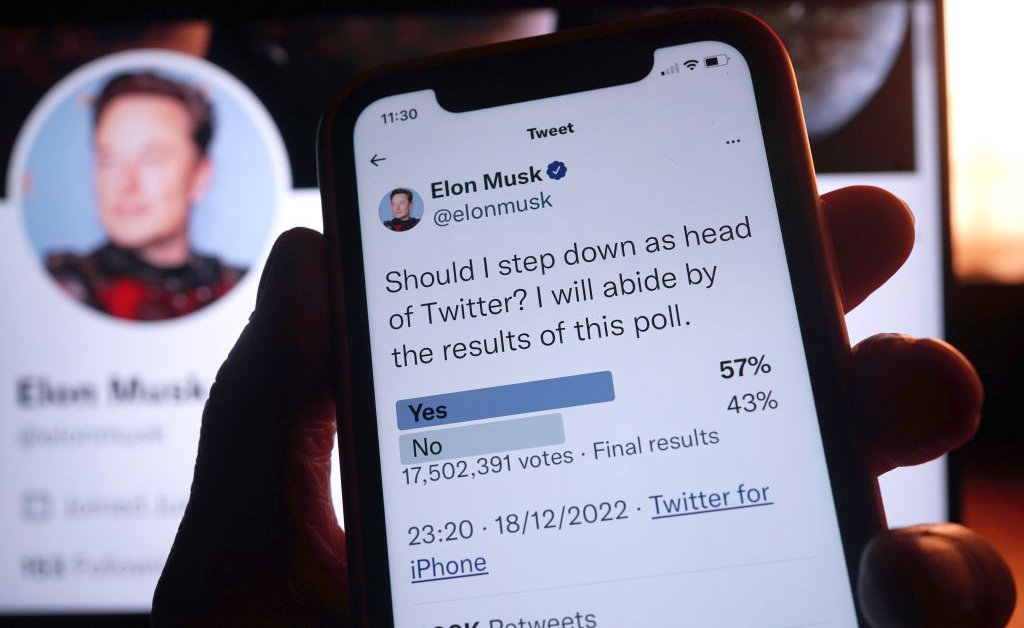The world of journalism is obsessed with Elon Musk.
Last week, Musk suspended the accounts of a group of journalists, claiming that they endangered him and his family by revealing locations in real time. One of the accusations—about stalking Musk’s son—has been called into question because Musk did not file a police report. What is not contested is that some of the journalists tweeted about the suspension of an account called @elonjet which had published publicly available information about the whereabouts of Musk’s private jet. The common element in every suspension is journalism that has been critical of Musk and his business practices.
Twitter reinstated most of the journalists a day later, leading to sighs of relief and widespread speculation about new rules for journalists on Twitter.
Journalists who take Musk’s actions seriously—a huge number, by all indications—are making a terrible mistake. It is the same mistake journalists made in covering Donald Trump in 2016. They are consumed by spectacle and fail to recognize the larger issue: they are being manipulated with the goal of making them submissive.
Like Donald Trump, Elon Musk does not respect journalists. Even those who do Musk’s bidding are not safe, as Bari Weiss discovered shortly after she amplified internal Twitter communications related to the story about Hunter Biden’s laptop.
The present moment is fraught. If journalists bend to Musk’s will, as many seem to be doing now, there may be no limit to the harm that results.
Donald Trump demonstrated that spectacle is good for media profitability. As former CBS executive Les Moonves famously stated about Trump’s antics: “It may not be good for America, but it’s damn good for CBS.” Moonves was acknowledging something that should disturb us all: in the age of Trump, media executives chose to prioritize profits over the protection of democracy and the pursuit of truth. Gone was any acknowledgment that journalism has a duty to stand up to power and to hold a lens up to society, not just broadcast the circus.
Read More: Elon Musk Has Lost Sight of What Matters
One might have expected journalists to learn a lesson from their experience with Trump. They might have learned from the serial humiliations that characterized press briefings in the Trump White House, from the never-ending lies and blatant attempts to control the story by giving access to a privileged few who were willing to play along or be manipulated.
Instead, journalists are enabling Musk to do exactly what Trump did. They are trying to discern new rules when they should be focused on the bigger picture.
The simple fact is that there is no logic to what Musk is doing.
Elon Musk craves attention. Twitter is a soap opera where Musk is the star, the only actor in the spotlight. It is a private business where he can set the rules and change them whenever he wants. He does not have to be consistent. He does not have to be fair. Twitter is Musk’s toy and he is having fun with it. Even if he gives up the CEO title—as he may do following a user poll—he will pick his successor and still control Twitter.
Journalists cannot win by appeasing Musk. They can only win by doing their job, by standing up to the powerful in the public interest.
Twitter is a platform for unmediated broadcasting to roughly a quarter billion active users. As such, it has become the platform of choice for politicians, celebrities, and journalists. Some communities that are normally excluded from the political process depend on Twitter to get their message out. Users love Twitter because it creates the illusion of direct access to VIPs to whom they would normally have no access.
Twitter is where journalists look for leads. Some have characterized Twitter as the assignment editor for modern journalism. Twitter has enabled journalists to build personal brands in an era when traditional media is struggling for financial survival. Thanks to Twitter, and 24-hour news channels, some journalists have become celebrities.
Now journalists are trying to build a presence on Mastodon, Post.news or other possible alternatives, but most remain active on Twitter because of its huge advantages of scale and their impact there. Many journalists believe the current issues with Musk are an extreme form of the flawed Twitter they have come to love, the one they have long described as a “hell site.” They desperately want Twitter to remain viable as a platform, for Musk to get bored and move on. As a result, they are not thinking clearly about what is at stake.
Elon Musk is part of a growing community of Silicon Valley billionaires (such as Peter Thiel and X) who believe democracy is obsolete and that a free press undermines technological progress. What they want is a world where they are the puppet masters, where so-called journalists act as amplifiers of the messages they want to spread, and where no one ever criticizes them. These people live in a bubble, surrounded by sycophants, with little or no contact with the world experienced by the masses. As we saw with Mark Zuckerberg and Samuel Bankman-Fried, these people have no qualms about causing harm to society—to real people—in pursuit of their goals.
As disturbing as I find the response of journalists to Musk, that is not the most significant issue I see. Last week, NBC suspended one of its reporters, Ben Collins, because something he said about Elon Musk was “not editorially appropriate.” The suspension appears to have been triggered by a Twitter conversation in which Musk said he had just learned that his company’s deputy general counsel had previously worked at the FBI, to which Collins commented that “the scandal here is that Elon Musk discovered who his company’s deputy counsel was six weeks after he purchased it” for $44 billion.
In what world would that tweet be editorially inappropriate? Certainly not on Twitter. For at least a decade, media companies like NBC have encouraged their journalists to use social media to increase reach and build their brand. They believe it is good for business. They know that the tone and standards on Twitter are very different from those in newspapers and television news. No matter what you think of the tone, and I think it is fine, Ben Collins’ tweet is manifestly accurate. He was doing his job, speaking truth to power.
While NBC has not yet commented on the story, it is hard to escape the notion that whoever made the decision was more worried about appeasing Elon Musk and the growing army of right wing extremists who support him than in protecting the integrity of NBC News.
Imagine what would have happened had those in power at The New York Times or The Washington Post backed down to pressure from the Nixon administration and not published the Pentagon Papers. Or if the Post had spiked the stories by Woodward and Bernstein about Watergate. Lest you think those analogies inappropriate, remember that we are less than two years removed from an insurrection at the U.S. Capitol. Musk has been restoring the Twitter accounts of far right activists. It may be a coincidence, but we cannot ignore the possibility that Musk’s sympathies may lie with insurrectionists.
If NBC does not reverse its decision, how long will it be before another network, perhaps CNN, suspends one of its journalists to appease the far right. What if suspending journalists becomes the price of access to billionaires? Where will we be then? Standing up to power is what journalism is all about. Everything else is public relations.
Journalism does not need Twitter. It cannot win a fight with Elon Musk on Musk’s home turf. The only way to beat people like Musk is to not play that game. That is the lesson we should have learned from Trump. It is the lesson we must learn now.
More Must-Reads From TIME



